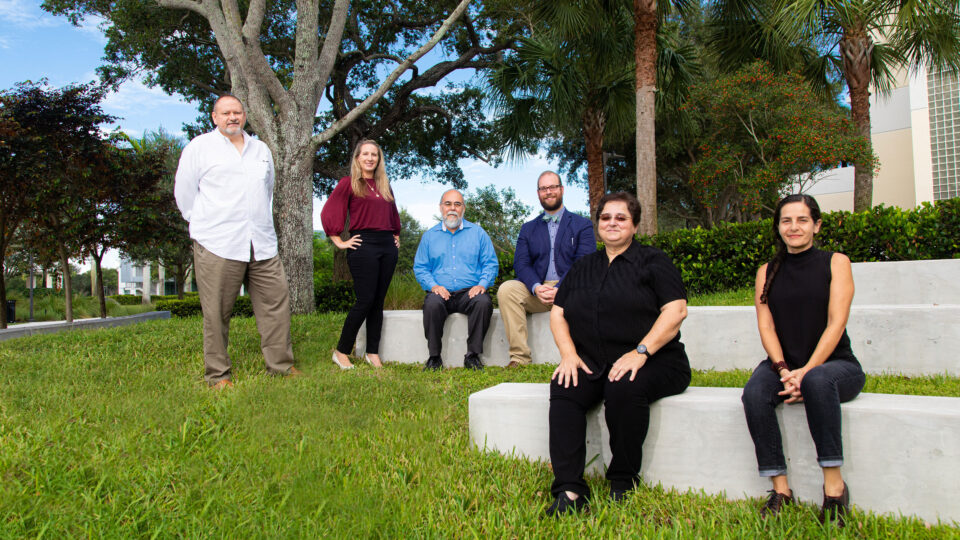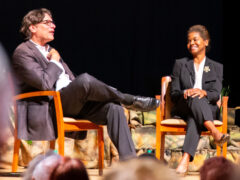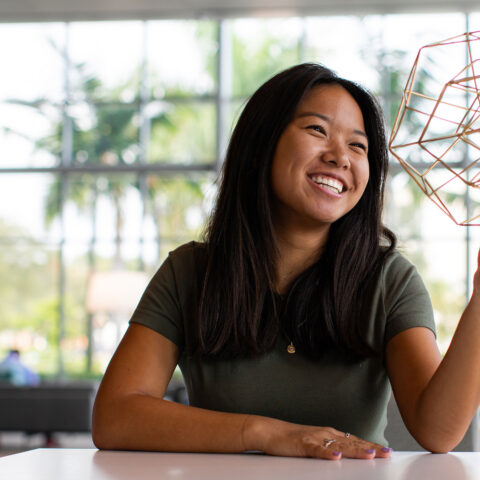With an urgency propelled by the digital and social upheaval of a new millennium, in 2010 Lynn University took on the challenge of reimagining its liberal arts education. The school developed and launched the Dialogues, restructuring the classic college curriculum in a way that was entirely its own.
"A good curriculum is living, breathing and has to be nurtured to ensure it is meeting the needs of current students," said Dr. Katrina Carter-Tellison, vice president for Academic Affairs. From its inception, the Dialogues focused on the big questions of liberal arts, designed so students could explore four essential themes: Self and Society, Justice and Civic Life, Belief and Reason, and Quantitative Reasoning and Scientific Literacy.
Now a decade later, Lynn has revised the Dialogues for a new era.
"We went back to the basics," said Dr. Gary Villa, dean of the College of Arts and Sciences, who led the update. "We started with learning outcomes—asking ourselves what our students need to understand and what skills they need the most. We built the curriculum around that."
Tellison said this flexibility and commitment to relevance have been critical to the program's approach. "We knew from the start we wanted to continue to stay relevant and offer an education that would prepare our students for the future."
Liberating their thinking
With both iterations of the Dialogues, it started with a task force to discuss Lynn's core curriculum. Up for debate: Is Lynn ripe for a whole new instructional paradigm?
The first committee 15 years ago agreed the timing was right and the need was sufficient for a transformative redesign. It was a process of freeing themselves from the conventions and expectations of what already existed. The result was a purposeful dismantling of the core curriculum.
This time? Just some judicious fine-tuning of the Dialogues' big ideas and a few modifications to its operations.
Based on an examination of emerging trends in education, technology and the marketplace, plus feedback from students and faculty, the new Dialogues kicked off in 2020, perhaps the weirdest year that ever was in higher education. Still, the rollout was a success.
"The Dialogues is intentional and foundational," Villa said. "In the 100 and 200 level courses, we're looking at the basics of the scientific method and algebra, but we're concerned about how this knowledge is applied. So, we include a personal finance course. It's taught in context and it's knowledge they need, so students are more engaged with it and understand the theme for its real-life applications."
Branden Ellis, a senior from Illinois majoring in forensic investigations, said the personal finance class is the perfect example of why the Dialogues curriculum is so effective.
"It taught me about real-life issues and helped me form an idea of how I want to live and spend my money," he said. "It helped me with budgeting and understanding the full cost of items."

Curricular innovation
In recent history, higher education has tended to emphasize depth over breadth, focusing students more and more narrowly as they progress toward graduation. The idea is for students to gain expertise in their discipline by concentrating their coursework in their major.
In a liberal arts education, the emphasis is breadth over depth. Much of the coursework is outside of the major, based on the belief that students who explore and experiment with different disciplines and ways of thinking acquire a deeper knowledge and a broader skillset to solve problems and live as responsible global citizens.
If the first approach could be seen as pragmatic to a fault, the liberal arts could be seen as a bit idyllic. However, the liberal arts as Lynn teaches it through the Dialogues is very much grounded in the real world. It is a future-focused liberal arts curriculum, informed by the traditions of the past but not beholden to them.
"The old system said you needed a science with a lab for your general education requirements, for example," Villa said. "The problem is that students make no connection to how these classes relate to their major or to each other. How will they use it? Why should they be invested in it?"
Taught as a series of interconnected, interdisciplinary seminar-style courses, the Dialogues program nurtures collective wisdom and experience. No matter their major, every Lynn student enrolls in 20 Dialogues courses in a charted progression over their four years. With a range of courses, there is flexibility in fulfilling the themes from the 100 level to the 400. The goal is for students to connect each course to their own major, to their education more broadly, and to their lives and future careers.
"We're creating a body of knowledge here," Tellison said. "That's the essential challenge and reward."

Character study
Designed to deepen the habit of learning, the Dialogues also promotes the personal qualities that matter within and beyond the classroom—compassion, contemplation, citizenship and courage.
Sydney Putnam '14, '15 was among the first students enrolled in the Dialogues. It was the talk of the campus when she arrived as a first-year student, but she was less than enthusiastic. Up to that point, her school experiences had been a struggle, punctuated by punishment and frustratingly average performance, due in large part to mental health conditions, including ADHD and OCD. Though she thought the concept of themed instruction was "weird" compared to the classic liberal arts curricula at her friends' New England schools, she soon discovered with the Dialogues the pleasure of learning in a safe environment, where critical (and sometimes challenging) thinking was encouraged. She called it the best experience of her life.
"To this day, I reference my class, Myth, Magic and Religion," she said. "Funny, a philosophy and religion class from a program I was wary about is the core of my daily outlook over a decade later."
The themes of the Dialogues chosen in 2010 seem almost prescient, predating but pinpointing the concerns of Black Lives Matter, #metoo, the pandemic and challenges to our democracy.
"What is happening around us and to us informs the work we do in the classroom," said Tellison, who has taught Justice and Civic Life and the Citizenship Project. "It has been my feeling from the beginning that the themes of the Dialogues represent the compilation of human knowledge and experience."
For Ernsince Jeudy, a senior from Florida majoring in criminal justice, the Dialogues seminar on police ethics was particularly resonant. He is a veteran, an Army Military Police Officer, and was moved to hear the diverse opinions regarding policing in America.
"Each and every individual had different experiences with police," he said. "Some were positive. Some were negative. This allowed me to learn how to be a better law enforcement official for my future career with the FBI or federal law enforcement."

For a good job and a good life
Lynn further integrated feedback from employers about the skills they need from graduates, thanks to the alignment of career planning and alumni relations.
"A major update to the Dialogues is increasing opportunities for collaboration and enhancing students' adaptability," Tellison said. "Students need experience with long-term research projects. In the workplace a project can take months or even years to complete. We now have students collaborating on projects that could take the whole semester."
Data, logic and analytics are being integrated into select courses at different levels of the Dialogues, with hopes to provide industry-recognized credentials.
But the most practical upgrade to the Dialogues is both a classical liberal arts component and a necessity in the job market of the future: communication. Every Dialogues seminar includes writing and presentation skills.
"The first improvement we definitely saw was oral presentation," Villa said. "They improved dramatically and very quickly."
Previously, students might have made a single presentation by their sophomore year and never again. Now, they're presenting in five classes every year.
"I have gotten better at public speaking because of the discussions and presentations done in the class," said Roshauna Bennett, a sophomore from Jamaica majoring in international business. "The course also taught me to communicate my thoughts better."
Likewise, Ellis finds his writing has improved. "I credit that to the fun assignments we worked on. My professors allowed me to write about interesting topics that I enjoy."
Jeudy's vocabulary has expanded as much as his worldview. "I'm able to confidently present material in class and have open-ended discussions without hesitation."
While these enhancements to the Dialogues program are practical and engaging, they're also skills with both staying power and earning power.
A 2019 report by Georgetown University's Center on Education and the Workforce found that liberal arts graduates will realize a 25% higher return on their educational investment over 40 years compared to other types of higher education.
"The challenge is to adhere to the tenets of a liberal arts education but at the same time include information relevant to students' lives today," Tellison said. "The foundation of this curriculum is the faculty. They have the courage to challenge themselves and to embrace innovation. That's our commitment to Lynn students."


Share this page